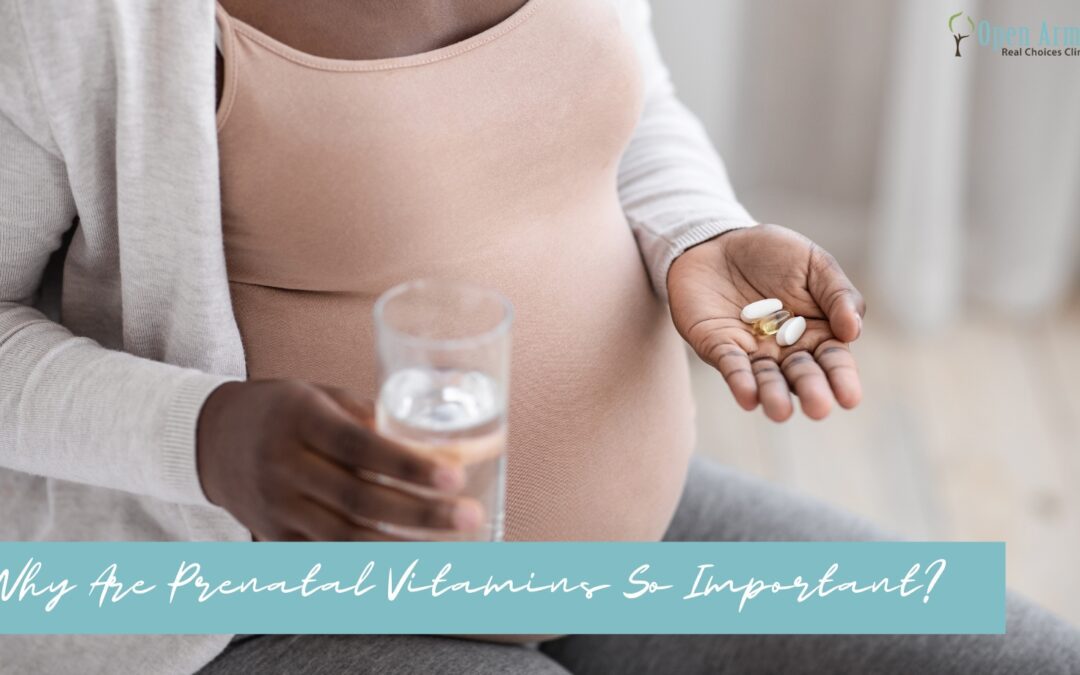When a woman becomes pregnant, an incredible transformation begins. Every physical system in her body adjusts to accommodate the process of creation. Her blood volume increases to support the baby’s development, her organs make room for her expanding uterus, and her appetite increases to meet the caloric needs of the new life within. A good prenatal care provider helps ensure that an expectant mother gets the resources that her body needs for the herculean feat of growing a new person, including ample rest, regular exercise, and all the nutrients essential to prenatal health. To make sure these nutritional requirements are met, most OB/GYNs recommend prenatal vitamins.
Prenatal vitamins are specially formulated supplements for pregnant women that provide essential nutrients to support mom’s health and the baby’s development. At Open Arms Real Choices Clinic, we want to help you understand the importance of prenatal vitamins and how they contribute to a healthy pregnancy.
The Essential Role of Prenatal Vitamins
Prenatal vitamins are designed to fill nutritional gaps in your diet, ensuring you and your baby receive the necessary nutrients for optimal health, even on days when morning sickness or other issues might prevent you from eating as well as you might like. During pregnancy, your body’s nutritional needs increase significantly, and even a well-balanced diet might not provide all the essential vitamins and minerals.
Folic Acid: Preventing Neural Tube Defects
One absolutely critical element of a prenatal vitamin is folic acid. Folic acid, a B vitamin, plays a vital part in preventing neural tube defects, which are serious congenital defects of the brain and spine. These defects can occur in the early stages of pregnancy, often before a woman even knows she is pregnant. Therefore, it is recommended to start taking folic acid even when planning to conceive. Doctors advise a daily intake of at least 400 micrograms of folic acid to minimize the risk of these birth defects significantly.
Iron: Supporting Blood Supply
Iron, another core ingredient in prenatal vitamins, is also important. During pregnancy, your blood volume expands to meet the demands of an extra circulatory system and your growing body, which can lead to increased iron needs. Iron is used in generating hemoglobin, the protein in red blood cells that delivers oxygen to the tissues in your body and in your baby’s. Adequate iron levels prevent anemia, a condition characterized by fatigue and weakness, and ensure that both you and your baby receive sufficient oxygen. Iron-containing vitamins pose a challenge to some women, as they can cause upset on an empty stomach. Eating a small snack before taking your supplement can help prevent this problem.
Calcium and Vitamin D: Building Strong Bones
Calcium and vitamin D are both vital for the development of your baby’s bones and teeth. Prenatal vitamins typically contain these nutrients to support your baby’s skeletal development and prevent the depletion of your own calcium stores. Sufficient calcium intake also reduces the risk of osteoporosis later in life, while vitamin D enhances calcium absorption and supports your immune system.
DHA: Promoting Brain Development
DHA, or docosahexaenoic acid, is an omega-3 fatty acid crucial for the development of your baby’s brain and eyes. Some prenatal vitamins include DHA, but you can also get it through a diet rich in fatty fish or in separate DHA supplements. Ensuring adequate DHA intake supports cognitive development and may improve your baby’s neurological health outcomes.
Iodine: Supporting Thyroid Function
Iodine is a main component in thyroid function, which regulates metabolism and plays a critical role in brain development. Pregnant women need higher levels of iodine to support their baby’s growing thyroid gland. Prenatal vitamins with iodine help prevent developmental delays and support healthy growth.
Choosing the Right Prenatal Vitamin
Not all prenatal vitamins offer the same benefits, so be sure to read labels and choose a high-quality supplement. Look for prenatal vitamins that include:
Folic acid: At least 400 micrograms
Iron: Around 27 milligrams
Calcium: About 1,000 milligrams
Vitamin D: 600 IU (international units)
DHA: Around 200-300 milligrams
Iodine: 150 micrograms
Be sure to let your physician know before starting any supplement to ensure it meets your specific requirements and to address any questions or worries you may have, such as dietary restrictions or pre-existing health conditions.
Maintaining a Balanced Diet
While prenatal vitamins are essential, they should complement a balanced diet, not replace it. Eating a variety of nutrient-rich foods provides additional benefits that supplements alone cannot offer. Focus on incorporating fruits, vegetables, whole grains, lean proteins, and dairy into your daily meals, and resist the urge to indulge your every craving for sweets or breads, which have little nutritional value. Don’t worry, though—once-in-a-while treats are fine; we would never deny a pregnant mom the pleasure of an occasional Oreo Blizzard.
Just remember, prenatal vitamins are an essential building block in your prenatal care plan, providing essential nutrients that support both maternal health and fetal development. At Open Arms Real Choices Clinic, we encourage you to put your health and the health of your baby first by taking prenatal vitamins and maintaining a balanced diet. A healthy start begins with proper nutrition. By understanding the importance of prenatal vitamins and making informed choices, you can promote a healthy, happy pregnancy and a bright future for your baby.


